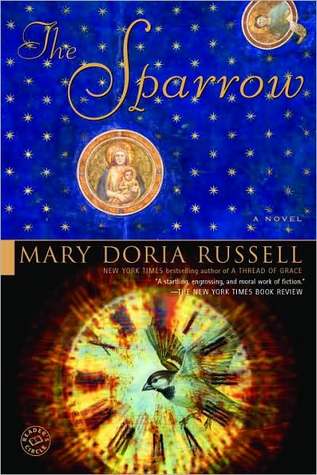Page count: 408 pages
Rating: 4 stars
In 2060, disgraced Jesuit priest Emilio Sandoz is the only survivor left after an expedition to the planet of Rakhat. He's grievously injured, both physically and mentally, and refuses to speak to the investigators who are desperate to find out what went wrong, far away on the alien planet. Sandoz stands accused of some pretty terrible crimes, and slowly the story of what took place several light years away is revealed.
Proof of extra terrestrial life is discovered in 2019 in a small and fairly insignificant listening post in Puerto Rico. While the United Nations and other global powers are still trying to figure out what to do about the discovery, the Jesuits organise a scientific mission in secret, sending eight people to the newly discovered planet, Rakhat, hoping to establish communication and peaceful relations with the aliens whose heartbreaking songs proved their existence on Earth. Emilio is one of the eight, and at least six of the other members of the exploration crew are close personal friends of his. "They meant no harm" is the final line in the prologue, and it's such an ominous hint of what's to come in the rest of the novel.
The Sparrow is not an easy read. It was one of three books suggested to me by Jen K to complete a square on my Book Bingo card, and I must admit, I ended up reading it both because it was the shortest of the three, because I've seen it so highly rated elsewhere for years and because I keep trying to make myself like science fiction, something that only rarely seems to work out. The book reveals pretty much in the opening section that all the characters we keep reading about in 2019 are no longer alive in the sections that take place in 2060. That made me depressed throughout the book, and bracing myself for the worst, long before it's actually revealed what actually happened, and what "harm" the well-meaning Earthlings actually caused.
Once the truth of what had happened to Emilio and all his friends was finally explained, it was also more tragic and even worse than I had imagined, and really very unpleasant indeed. It's a very well written book, and it deals with a a number of philosophical, metaphysical, moral and religious questions without providing any easy answers. I can totally understand why so many people rate it very highly. Unfortunately, I didn't actually enjoy reading large parts of the book. While it was great to see how the various members of the Stella Maris expedition came to meet and befriend each other, and their wonderful discoveries on the alien planet, I knew from the start that all of them except Emilio were doomed, and it was very clear from early on that he wished he'd died, as well. So I don't think I'll be reading the sequel, and I really wish that the book hadn't scarred me, because that's the only word I can think of to describe it, as much as it did.

I've been waiting to see what you thought ever since I saw you finished it on Goodreads. I'm sorry it wasn't an enjoyable read for you, but your review captures the book so well!
ReplyDeleteMinor SPOILER for Sequel:
So some of the chapters in the second book are from the perspective of the alien that imprisoned Emilio, and that part is rather heartbreaking as well because he didn't mean to betray or hurt Emilio - it was a cultural misunderstanding because Emilio said he wanted to serve, and based on his background, he understood that as sexually ... he was actually trying to help him; the hands are explained as well as a similar misunderstanding.